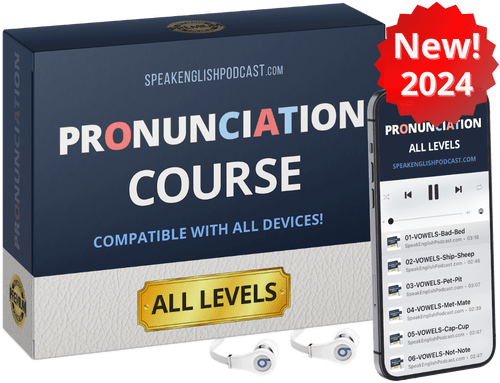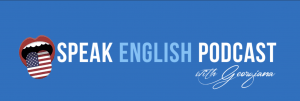#295 Speaking Mistakes
Transcript:
Ever wondered if native English speakers make mistakes? Well, here’s the truth: Native English speakers make mistakes, too! This can be comforting for English learners.
Hi! I’m Georgiana, and I’m back with a new episode. I’m here to help you speak English fluently.
If you want to help me, SHARE the podcast with your friends and family. That would mean a lot. Thanks.
On my website, you can find the 5 Secrets to Speaking English and my premium courses.
Before we start, get the transcript. Visit: SpeakEnglishPodcast.com/podcast
It’s completely free!
Ok, let’s start!
Native speakers of any language make mistakes, just like learners do. This is a natural part of language use and communication.
Let’s learn the mistakes native English speakers make and why they happen.
Pronunciation Mistakes: It’s common to mispronounce hard words. For example, some people say “Pacific” instead of “specific.”
Spelling Mistakes: Even people who have spoken English from birth can spell words wrongly. It’s like writing “definately” when it should be “definitely.”
Misusing Words: Sometimes, people mix up words that sound the same, like “their” and “there.” Or, they might use the wrong preposition. These are often just small mistakes.
Why Mistakes Happen:
- Informal Language: In everyday talk, people use short forms like “gonna” instead of “going to.” These are okay when speaking but not in formal writing.
- Speaking Fast: Often, people talk quickly and don’t think about grammar rules.
- Not Paying Attention: Everyone makes more mistakes when they are tired or not focused.
Learning from Mistakes:
When kids learn to speak, they make many errors. As someone learning English, you should see mistakes as a chance to get better. Most of the time, when people correct their mistakes, kids don’t get embarrassed. They might even laugh about it.
Attitude Toward Mistakes:
Most people understand that mistakes happen, and they don’t usually stop us from understanding each other. Remember, making mistakes doesn’t mean you’re bad at English. It means you are learning and getting better. So, if you make a mistake, just smile and try again. Even people who have spoken English their whole life are still learning!
Great! I hope you’re enjoying this episode!
And now, let’s continue with a mini-story.
Mini-Story 📖
(Practice your speaking)
I will tell you a story by asking simple questions. I use this method in my premium courses because it’s highly effective.
First, I say a short sentence with facts. Then, I ask you questions. After each question, you answer. Then, I tell you the right answer. That’s how we make the story.
And if you want to improve your fluency much faster, check out my Premium Courses:
SpeakEnglishPodcast.com/courses
You will find several levels.
Okay! Let’s start!
Everyone makes mistakes in English, even people who grew up speaking it.
Do you believe everyone makes mistakes in English?
Yes, I believe everyone makes mistakes.
Are you sure people who grew up speaking English make mistakes?
Yes. I am sure everyone makes mistakes, even those who grew up speaking English.
Do you think only kids make mistakes?
No, not just kids; I think every person makes mistakes, not just kids.
In your opinion, only English learners make mistakes?
No, no. In my opinion, both English learners and native speakers make mistakes.
Mistakes often involve mixing up words or misspelling them.
Do you think mistakes in English are always about grammar?
No, I don’t think mistakes in English are always about grammar.
Do you believe mistakes often involve mixing up words?
Yes. I believe mistakes often involve mixing up words.
How about misspelling words? Is that also a mistake?
Yes. In my view, spelling words incorrectly is also a mistake.
Mixing up what?
Mixing up words. I believe mistakes often involve mixing up words or misspelling them.
People use informal language in casual conversations, like “gonna” for “going to.”
Do you believe people always use formal language in casual conversations?
No, I don’t believe people always use formal language in casual conversations.
In your view, what type of language do people often use in casual conversations?
In my view, people often use informal language in casual conversations.
Do you believe “gonna” is an acceptable form of language in casual conversations?
Yes, I believe “gonna” is commonly accepted as informal language in casual conversations.
What do you think “gonna” means?
I think “gonna” is a contraction of “going to.” It means “going to.”
Sometimes, people make mistakes because they speak too fast or don’t pay attention.
Do you believe people make mistakes always or sometimes?
Sometimes. I believe people make mistakes sometimes, but not always.
Why do people sometimes make mistakes?
I think people sometimes make mistakes because they speak too fast or don’t pay attention.
Do they speak too slowly or pay too much attention when making mistakes?
No, no. I believe people don’t speak too slowly or pay too much attention when making mistakes. They make mistakes because they speak too fast or don’t pay attention.
Learning from these mistakes is a key part of improving language skills.
Do you think learning from mistakes is bad?
No, no. I don’t think learning from mistakes is bad.
Do you believe people need a key to improve their language skills?
No, no. I believe people don’t need a key to improve their language skills.
What is key?
I think learning from mistakes is a key part of improving language skills.
Native speakers usually understand and forgive mistakes, knowing they’re part of learning.
In your opinion, do all native speakers understand mistakes?
No, no. In my opinion, not all native speakers understand mistakes, but native speakers usually understand mistakes.
Do you believe native speakers always forgive mistakes?
Not always, but usually. I believe that native speakers usually forgive mistakes.
Who do you think understands and forgives mistakes? English learners?
No. I don’t think English learners usually understand and forgive mistakes. I believe native speakers usually understand and forgive mistakes.
Embracing mistakes instead of being afraid of them can greatly improve language learning.
Do you believe language learners need to embrace native speakers?
No, no. I don’t believe language learners need to embrace native speakers.
What do language learners need to embrace?
Mistakes. They need to embrace mistakes.
Should native speakers need to be afraid of making mistakes?
No, no. I believe that native speakers should not be afraid of making mistakes.
Can embracing mistakes worsen language learning?
No. In my view, embracing mistakes greatly improves language learning.
Well, we’re finished with our short practice.
Answering many simple questions can improve your speaking, just like talking in real life.
Today, you’ve tried a small part of this question-and-answer technique. Do you want to learn more?
Get my premium courses! Visit: SpeakEnglishPodcast.com/courses




0 Comments